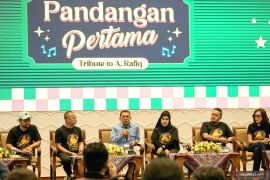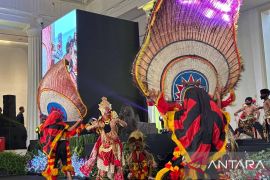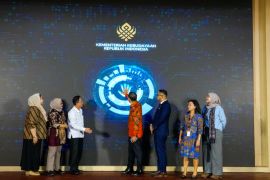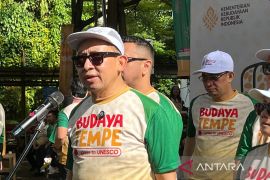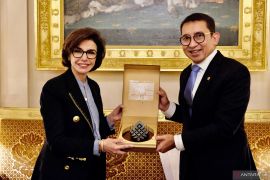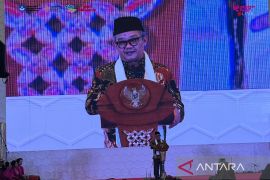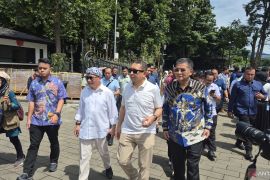On several social media platforms, foreigners and singers from the United States, France, Thailand, Russia, and other countries can be seen performing dangdut fluently and joyfully.Bondowoso, East Java (ANTARA) - Indonesia possesses a wealth of culture in the arts, including music, such as dangdut, a genre beloved by people across all social classes.
While locals may be accustomed to undervaluing what is uniquely theirs, foreigners often find that something distinctive can be extraordinary.
The viral spread of the pacu jalur dance abroad proves how traditional culture holds strong appeal for foreign audiences.
In the Indonesian society, dangdut is often associated with "village music." Yet, every person, from any nation, has a subjective taste in music that cannot be measured by social class.
Dangdut, a hybrid genre of Malay, Indian, and Middle Eastern influences, captivates with its lively rhythm, drum beats, and distinctive vocal ornamentation that bring joy. When dangdut music plays, everyone feels compelled to move.
On several social media platforms, foreigners and singers from the United States, France, Thailand, Russia, and other countries can be seen performing dangdut fluently and joyfully. This shows that what is often considered of low value domestically might be highly interesting to outsiders.
It is therefore understandable that Minister of Culture Fadli Zon proposed music, particularly dangdut, as a means of soft power diplomacy.
Zon noted that other countries have already conducted diplomacy through music and gained worldwide recognition, such as the United States, India, and South Korea.
He emphasized that Indonesia is rich in dangdut talent, and the genre has naturally evolved into various stylistic fusions.
“For instance, dangdut koplo and performances using regional languages — these will be easily accepted everywhere,” he said on October 25.
Zon underscored that dangdut is one of the most popular music genres and holds a special place in the hearts of the Indonesian people.
“We know that music is a form of soft power. Many countries have leveraged music as their soft power. We want dangdut to also become a global dangdut wave,” he said.
The minister stressed that state support for dangdut promotion aligns with the constitutional mandate to advance culture.
“The dangdut wave must contribute to global civilization, because as mandated in Article 32 Paragraph (1) of the 1945 Constitution, the state advances national culture within world civilization while ensuring the community preserves and develops cultural values,” he explained.
Related news: Tourism Minister supports dangdut music concert to revive economy
Bridge of diplomacy
For South Korea, music has become a tangible bridge between nations, now known globally as the “Korean Wave,” or K-Pop.
K-pop has surpassed the popularity of American pop and rock music, becoming a genre adored and enjoyed by people worldwide, including Indonesians.
Meanwhile, dangdut, with its signature instruments such as the ketipung drum and flute, can also create a festive atmosphere.
In other music genres, a singer usually engages the audience mainly through vocal melodies; in dangdut, the audience actively participates, moving their bodies in rhythm.
Dangdut promises a cathartic charm — a release of stress and relief for troubled minds, even among listeners outside Indonesia.
It is almost certain that no one dances to dangdut with a frown; everyone moves with a cheerful face and a smile.
Previously, the Indonesian government had sought to expand soft power diplomacy through the Indonesian language. Now, dangdut music could become its most effective tool.
In addition to being an official language at UNESCO, Bahasa Indonesia has become an attractive field of study for foreign students in many countries. Several universities abroad now offer Indonesian language programs.
As is often the case when learning a foreign language, music is frequently used to accelerate mastery.
Dangdut thus finds its moment — not only to entertain Indonesians but also to invite foreigners to enjoy its rhythm. Dangdut can serve as a complementary tool for teaching the Indonesian language to foreign nationals.
Dangdut would also strengthen Indonesia’s cultural recognition, following UNESCO’s declaration of the gamelan as an Intangible Cultural Heritage on December 15, 2021.
Of course, realizing the Culture Ministry's vision of making dangdut a tool for soft power diplomacy requires hard work and broad support from all stakeholders.
Learning from K-pop’s global success, its rise did not happen overnight but through sustained effort.
K-pop and K-dramas achieved worldwide fame through well-planned investment. Thanks to the perseverance of all stakeholders — from the government to music industry practitioners — South Korea now reaps the rewards of cultural diplomacy through music.
Following Korea’s footsteps, Indonesia is witnessing the rising popularity of Chinese dramas.
For this reason, Indonesia needs well-planned efforts to popularize dangdut globally. Large-scale and consistent promotion is essential to make the world dance to dangdut’s beat.
To globalize dangdut, Indonesia must maximize social media, which has broken down barriers between countries. However, conventional promotion should also not be neglected.
Related news: Minister aims to make dangdut Indonesia's next soft power
Related news: Indonesia aims to register dangdut as UNESCO cultural heritage
Copyright © ANTARA 2025


